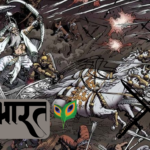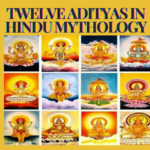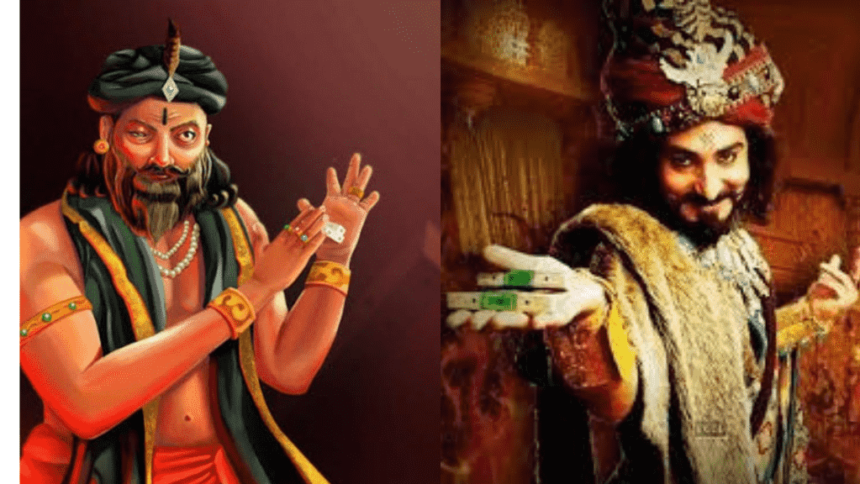The epic Mahabharata is full of complex characters, each of whom has their own motivations, virtues, and flaws. Among these characters, Shakuni was one of the most intriguing and controversial. While many people think that Shakuni is the main reason that why Mahabharata took place but if we study them him carefully , it seems Whatever he has done , he had done it right from a brother’s point of view. In this article, we explore Shakuni’s life, his motivations, and how he became one of the most important characters in this ancient epic.
Who was Shakuni?
Shakuni was a prince of the Gandhara Empire and brother of Gandhari, who became queen of Hastinapur after her marriage to Dhritarashtra. He is most infamous for his role in planning the Kurukshetra War, which led to the downfall of the Kauravas. But to understand Shakuni’s actions, we have to understand the reasons behind his deep hatred towards the Kuru dynasty.

| Aspect | Details |
|---|---|
| Full Name | Shakuni |
| Title | Prince of Gandhara; King of Gandhara |
| Family Background | Son of King Subala of Gandhara |
| Siblings | Gandhari (sister), 99 other brothers (according to some folk versions) |
| Spouse | Arshi |
| Children | Uluka (son) |
| Key Role | Main antagonist in the Mahabharata; mastermind behind the Kurukshetra War |
| Motivation | Revenge for the imprisonment and death of his brothers; hatred towards Bhishma for marrying his sister to a blind person. |
| Notable Actions | Manipulation of Duryodhana; Orchestrating the Game of Dice leading to the Pandavas’ exile |
| Symbolism | Represents cunning, intelligence, and the destructive power of revenge |
| Fate | Killed during the Kurukshetra War |
Shakuni’s family and background
Shakuni was born to King Subala of Gandhara, a region that corresponds to modern-day Kandahar in Afghanistan. His sister Gandhari was married to Dhritarashtra, the blind prince of Hastinapur. This marriage, arranged by Bhishma, was seen as a betrayal by Shakuni. Gandhari, who was known for her immense piety, decided to blindfold herself for life, so that she could share her husband’s blindness.

However, according to some folk traditions, the seeds of Shakuni’s enmity were sown much earlier. It is said that Dhritarashtra, driven by insecurity and power, imprisoned and killed 100 of Shakuni’s brothers, leaving only Shakuni alive. This act of cruelty filled Shakuni with an intense desire for vengeance.
Vow of revenge
Shakuni’s entire life became centered around one goal: to destroy the Kuru dynasty. He swore to avenge the injustice done to his family and saw the best opportunity in the rivalry between the Kauravas and the Pandavas. He was only taking revenge from Kauravas , Dhritarashtra and Bhishma pitamah ,for the fraud they had done with his sister Gandhari A master of strategy and cunning, Shakuni used his wit to fuel the fire of discord between the two branches of the royal family.
His influence on Duryodhana, the eldest of the Kauravas, was particularly significant. Shakuni was the man who convinced Duryodhana to challenge the Pandavas to the infamous game of dice, which eventually led to their exile and ultimately to war.
Shakuni’s Role in the Mahabharata
Shakuni is one of the most pivotal characters in the Mahabharata, with his actions directly influencing the events leading to the Kurukshetra War. As the uncle of the Kauravas, particularly close to Duryodhana, Shakuni became the mastermind behind many of the strategies that fueled the conflict between the Kauravas and the Pandavas. His influence over Duryodhana was profound, often guiding him toward decisions that were detrimental to the Pandavas and, ultimately, to the Kauravas themselves.
-
Shakuni’s Role in the Mahabharata
:
- Shakuni’s most infamous act was his role in the Game of Dice, where he cunningly manipulated the outcome to ensure the Pandavas’ defeat. Using his expertise with loaded dice, Shakuni orchestrated the loss of the Pandavas’ kingdom, wealth, and even their freedom. This act led to the Pandavas’ exile and set the stage for the Kurukshetra War. It was a pivotal moment in the Mahabharata, as it not only humiliated the Pandavas but also sowed the seeds of deep resentment and anger, which later culminated in the war

- Fanning the Flames of Rivalry:
- Throughout the Mahabharata, Shakuni played a critical role in escalating the rivalry between the Kauravas and the Pandavas. He was a master manipulator, using his sharp intellect and persuasive skills to influence Duryodhana’s decisions. Shakuni’s advice often centered around provoking the Pandavas and undermining their position in the kingdom, ensuring that the conflict between the two families would continue to intensify.
- Strategist in the War:
- During the Kurukshetra War, Shakuni served as one of the key strategists for the Kauravas. His knowledge of military tactics and his cunning nature made him a formidable adversary. While Duryodhana led the Kauravas on the battlefield, Shakuni was often the one devising strategies to outmaneuver the Pandavas. However, despite his efforts, the Kauravas were unable to overcome the Pandavas, largely due to the moral righteousness and superior strategy of the latter.
Shakuni’s role in Kurukshetra war
While Shakuni is often depicted as the main instigator of the Kurukshetra War, it is important to understand the larger context of his actions. The Kuru clan was already on the path of self-destruction due to the internal conflicts between the Kauravas and the Pandavas. Shakuni merely acted as a catalyst, setting in motion the inevitable.
The game of dice was Shakuni’s masterstroke. By using heavy dice, he ensured the Pandavas’ defeat, causing them to suffer exile and humiliation. This event was a major turning point in the Mahabharata, ultimately setting the stage for the war.
Death of Shakuni
Shakuni’s death came during the final stages of the Kurukshetra War, symbolizing the downfall of the Kauravas’ influence and power. Shakuni was killed by Sahadeva, one of the five Pandavas, who had vowed to avenge the suffering of his family. Sahadeva specifically targeted Shakuni as part of his vow, recognizing Shakuni’s role in orchestrating the events that led to the war.
- Shakuni’s death marked the end of one of the key instigators of the war. It was not just a personal vendetta but also a symbolic victory over the cunning and deceit that Shakuni embodied. His demise was a turning point in the war, signaling the impending defeat of the Kauravas.
- Despite his death, Shakuni’s legacy lived on as a cautionary tale about the dangers of revenge, manipulation, and the destructive nature of unchecked ambition. His life and actions serve as a reminder of the consequences that come from sowing discord and pursuing personal vendettas at the cost of others’ lives.
Was Shakuni truly evil?
To call Shakuni completely evil would be an exaggerated description of his character. Although his actions were undoubtedly destructive, they were motivated by a deep sense of injustice and a desire to avenge his family. In many ways, Shakuni can be seen as a tragic figure, consumed by a quest for vengeance.
His intelligence and strategic mind were unmatched, making him one of the most formidable characters in the Mahabharata. Yet, his inability to move beyond his personal vendetta ultimately led to his downfall.
Shakuni’s Legacy
Shakuni’s legacy is one of caution. His story is a reminder of the destructive power of hatred and revenge. Despite his cunning and intelligence, Shakuni’s life was ultimately consumed by his desire for vengeance, leading to the downfall of not only his enemies but also his own family.
Ultimately, Shakuni’s actions led to the destruction of the Kauravas, including his beloved nephew Duryodhana. His life is a testament to the idea that revenge often harms the seeker more than the target.





